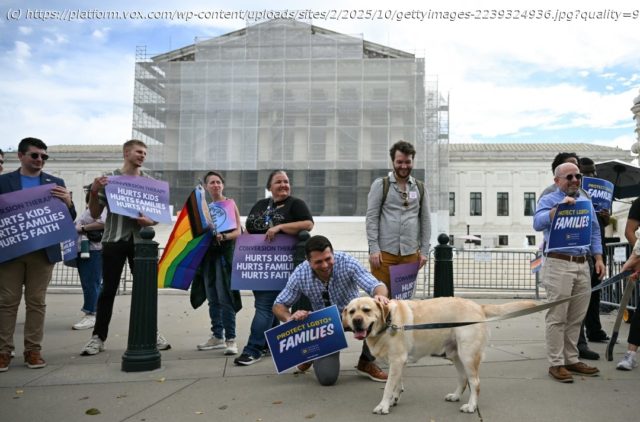The Supreme Court seems eager to kill state bans on anti-LGBTQ conversion therapy.
the Supreme Court broke from its increasingly common practice of deciding important cases without holding an oral argument or even explaining the reasoning of its decision, to hear a case about whether states may ban a practice known as “conversion therapy” — therapy sessions which seek to change someone’s sexual orientation or gender identity.
About half of the states have laws banning conversion therapy for patients under the age of 18, including Colorado, whose law was before the Court on Tuesday.SCOTUS, Explained
Get the latest developments on the US Supreme Court from senior correspondent Ian Millhiser.
Realistically, there was never any chance that this Supreme Court, which has a 6-3 Republican supermajority, would uphold the Colorado law at issue in Chiles v. Salazar. When this Court hears cases that place the interests of queer Americans against the claimed rights of religious conservatives, it consistently rules in favor of the religious right.
That said, two uncertain questions did emerge from the Chiles argument. One is whether the Supreme Court will immediately strike down Colorado’s ban on conversion therapy, or whether it will send the case back down to lower courts to apply a test known as “strict scrutiny,” which nearly all laws fail.
The more important question is to what extent the Court will strip state governments of their longstanding power to regulate health care and other professionals, at least when those professionals give dangerous advice to their patients and clients.
The Chiles case turns on two competing theories of the First Amendment. The plaintiff in the case is a therapist represented by a prominent anti-LGBTQ law firm known as the Alliance Defending Freedom. Her lawyer, James Campbell, said at oral argument that she wants to have “full conversations exploring issues of identity and gender,” and that “includes considering chang[ing]” a patient’s identity.
He also makes a fairly intuitive argument: talk therapists talk to their clients. Talking is protected by the First Amendment. Therefore, Colorado cannot prevent her from providing conversion therapy.
Colorado, meanwhile, points to the long history of states regulating the advice that licensed professionals give to their clients. A lawyer cannot tell a client that it is legal to rob banks, for example, even though this bad legal advice is just speech. Similarly, a doctor risks a malpractice suit or professional sanctions if they advise a patient to engage in unhealthy conduct.
Thus, in its brief to the justices, Colorado proposes a legal standard similar to the one used in many professional malpractice cases: The First Amendment permits states to regulate speech between a licensed professional and their client to ensure that the professional’s behavior aligns with the accepted standard of care within the profession.
Under that rule, Colorado’s ban on conversion therapy is lawful because, as one federal appeals court explained, “every major medical, psychiatric, psychological, and professional mental health organization opposes the use of conversion therapy.
Start
United States
USA — Criminal The Supreme Court fights over whether medical expertise actually exists






